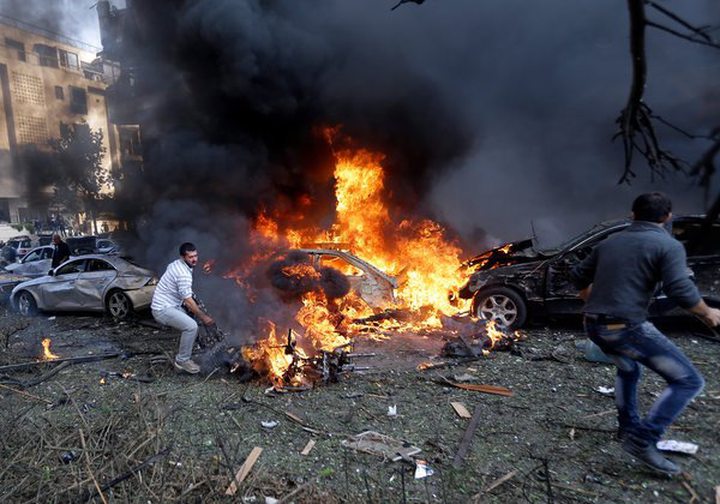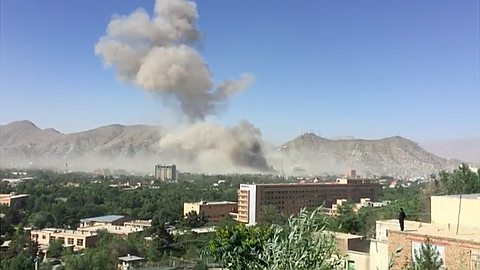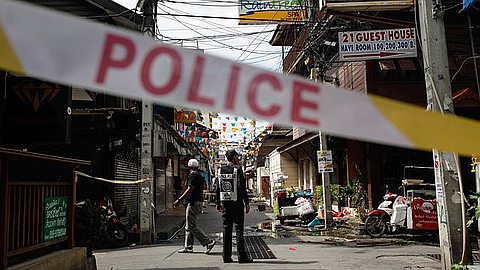Blasts at Iranian Embassy in Beirut Kill at Least 23

The attack seemed to fit a pattern of deepening political and sectarian division across the region inspired by the civil war in Syria. Syria’s conflict has drawn in fighters from neighboring Lebanon on both sides, with Sunni militants flocking to fight alongside rebels and Hezbollah, the powerful Shiite organization allied with Iran, sending its militiamen to support President Bashar al-Assad.
The bombings came as Syrian state media reported that the government had taken control of a rebel-held town near the Lebanese border, Qara, amid a widening army offensive that includes battles around Damascus, the capital, and the northern city of Aleppo and has increased tensions in Lebanon.
Humanitarian officials said on Tuesday that the bombardment of Qara has pushed an additional 10,000 Syrians into Lebanon, a country of 4 million people that already hosts more than a million Syrian refugees and fought its own 15-year sectarian civil war ending in 1990.
Lebanese media reported that responsibility for the embassy attack was claimed by the Abdullah Azzam Brigades, an offshoot of Al Qaeda with branches in several countries in the region, including Lebanon. The claim could not immediately be confirmed.
The Iranian ambassador appeared on news channels blaming Israel for the blast, which Israeli officials denied. More broadly, though, Lebanese officials and residents alike placed the bombing in the context of the Syrian war, which Lebanon’s political factions have fueled even as they call on citizens to keep the fighting outside of Lebanon.
Hezbollah members blamed what they call an alliance between Israel, the West and Islamic extremists that they accuse of targeting Hezbollah, Syria and Iran in retaliation for their anti-Israel stance. Members of the Future Movement, Hezbollah’s chief rival, said the bombing was provoked by Hezbollah’s involvement in Syria.
Hassan Nasrallah, the leader of Hezbollah, which is also Lebanon’s most powerful political party, declared in a speech last week that the group would continue to fight in Syria for as long as necessary. Hezbollah says it is fighting in Syria to protect the region from an insurgency it says is dominated by takfiris, a reference to radical Islamic groups, usually Sunni, that declare Shiites and other opponents apostates.
Hezbollah and the Syrian government are close allies, with the Syrians providing a land bridge for Hezbollah’s weapons supplies from Iran and Hezbollah fighting on important fronts in the Syrian conflict.
But Hezbollah’s involvement has been controversial within Lebanon, where the militant group justifies its independent militia as necessary to defend Lebanon from Israel, but where its opponents object to its fighting fellow Arab Muslims in Syria, on the side of a government that has bombarded civilians to put down what began as a movement for political rights.
Bilal Farhat, a member of the Lebanese Parliament representing Hezbollah, refused to draw a direct link to the Syrian conflict or earlier bombings targeting Hezbollah that killed scores of civilians in southern Beirut, where the party has strong support. “It’s targeting the positive Iranian role in the region,” he said. But he blamed “takfiris and those who are sponsoring them.”
Hezbollah has accused the United States and Israel of supporting such extremists in Syria, some of whom are linked to Al Qaeda or espouse other radical Sunni ideologies and have issued sectarian statements threatening Shiites and the related Alawite sect, to which Mr. Assad belongs.
“It is a message for the Iranian republic,” Mr. Farhat said. “They think in this terrorist act they can achieve something, but they failed.”
In the neighborhood, however, residents drew a direct link to the fighting in Syria. A woman who lives near the embassy stood nearby, shouting, “May God send Bandar to hell! This is the Saud family.”
It was a reference to Prince Bandar, the intelligence chief of Saudi Arabia and one of the leading proponents of the Syrian insurgency.
“Islam doesn’t do this,” the woman yelled “They found the body of the suicide bomber hanging on the balcony.”
The area where the attack took place, Bir Hassan, is populated by many Shiite Muslims. Apart from the Iranian diplomatic mission, it also houses an office of the Shiite Amal Party, an ally of Hezbollah. Civilians and random passers-by, from residents to delivery people, were wounded in the attack.
Residents and news reports said two explosions targeting the three-story embassy damaged at least six buildings in the embassy compound. Television images showed charred bodies in a rubble-strewn street lined with cars set on fire by the explosion and blackened trees. Bystanders were seen fleeing in panic.
Al Manar, a broadcaster aligned with Hezbollah, reported that the attack began when a car bomb exploded a few yards away from the embassy. A motorcycle being ridden into the embassy compound after the first blast exploded before it got to the embassy, Al Manar said.
That account tallied with news reports that one blast blew out the main gate to the embassy compound and a second detonated nearby. Workers at a restaurant 100 yards from the embassy said there had been two explosions, the second one much stronger than the first.
The attack followed earlier blasts in July and August against Hezbollah targets in the organization’s southern Beirut stronghold. Security has been stepped up in the area, with the Lebanese Army manning checkpoints there. More numerous Hezbollah checkpoints were initially set up, but removed after they caused friction with residents.
Balconies and windows on a residential-looking building were damaged. A line of parked cars was blackened and charred. A driver for the restaurant chain Pain D’Or, Mehdi Siblini, was taken to the hospital, according to another driver who did not give his name. He said he was delivering food nearby when the explosion went off. He brandished a sheaf of receipts that were spattered with blood.
Angelina Eichhorst, the European Union’s envoy in Lebanon, condemned the bombing, on Twitter, calling it a “despicable senseless act of violence causing death of too many innocent people.”





